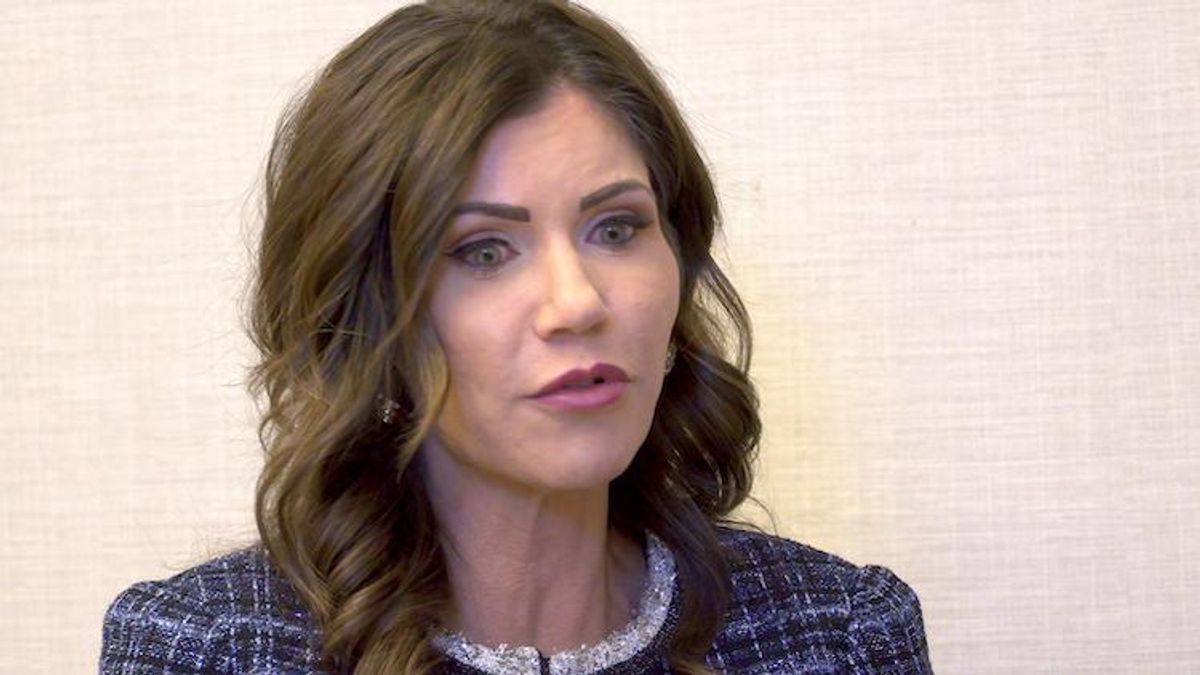South Dakota lawmakers have approved a bill banning "divisive concepts" in state college and university courses, which will affect content pertaining to LGBTQ+ issues, racism, sexism, and more -- and it now goes to Republican Gov. Kristi Noem, its author, for her signature.
The South Dakota Senate Monday OK'd House Bill 1012, which was already passed by the House of Representatives. It started out as a ban on the teaching of critical race theory, an academic concept that shapes some college courses and has been used as a bogeyman by far-right activists, who claim it instills guilt in white people and generally symbolizes everything they think is wrong with education.
It has been amended to be a ban on "divisive concepts" in higher education. Its definition of this includes "that an individual, by virtue of their race, color, religion, sex, ethnicity, or national origin is inherently racist, sexist, or oppressive, whether consciously or subconsciously" and "that individuals, by virtue of race, color, religion, sex, ethnicity, or national origin, are inherently responsible for actions committed in the past by other members of the same race, color, religion, sex, ethnicity, or national origin." It applies to schools governed by the state's Board of Regents and Board of Technical Education.
The latest version of the bill includes a note that because it has been extensively amended, it may not reflect the author's original intentions. Noem has apparently not commented publicly on the amendments. Notably, Noem, a rising star in the Republican Party, was the first governor to sign an anti-transgender sports bill into law this year. Iowa has followed.
Civil rights groups are denouncing the legislation. The Human Rights Campaign calls it a "curriculum censorship bill."
"Students should be taught an honest and accurate history of our nation, including the good and the bad," said a statement from HRC State Legislative Director and Senior Counsel Cathryn Oakley. "Young adults deserve an education that enables them to learn from the mistakes of our country's past to help create a better future. By teaching young adults the full scope of reality for LGBTQ+ and other marginalized people, both historically and today, we can help build a fully realized society where everyone can take pride in their individual identities.
"While educators want to provide every student an accurate and quality education, Gov. Noem and South Dakota legislators want to exclude certain communities and write people out of our history books. Educators should not be forced by politicians to teach lessons that edit or remove history to justify the harms of the past or present. We must create safe spaces for our educators to teach and our students to learn."
"Our country needs to acknowledge and reckon with its history of systemic racism -- this includes being able to teach and talk about these concepts in our schools," said Jett Jonelis, advocacy manager for the American Civil Liberties Union of South Dakota. "In the university setting, House Bill 1012 encroaches on principles of academic freedom that protect a professor's right to make teaching choices without government interference. That's because the First Amendment protects academic freedom and the right to share ideas, including the right of individuals to receive information and knowledge.
"House Bill 1012 creates more questions than answers and leaves South Dakota educators and administrators with the burden of navigating exactly what it means to comply with this law. It opens the door for a wide range of interpretations that could be used to chill free speech and academic freedom, discouraging open and honest discussions about systemic racism in classrooms and in higher education communities. That House Bill 1012 passed shows the very need for the types of discussion our government is trying to prohibit."
Sen. Troy Heinert, a Democrat who is a member of the Rosebud Sioux Tribe, said during a committee hearing that the bill would keep educators from teaching about his people's history.
"I do not blame any member of this committee for what happened or the plight of the American Indian. I know it is not your fault, but I do expect you to understand it and be empathetic as to some of the conditions that we currently live in right now," he said. "Let teachers teach. Let people understand the true history of our state, our country. We don't have to make them feel bad. That's not anybody's intention. But if you don't understand you're bound to repeat it."


















































































